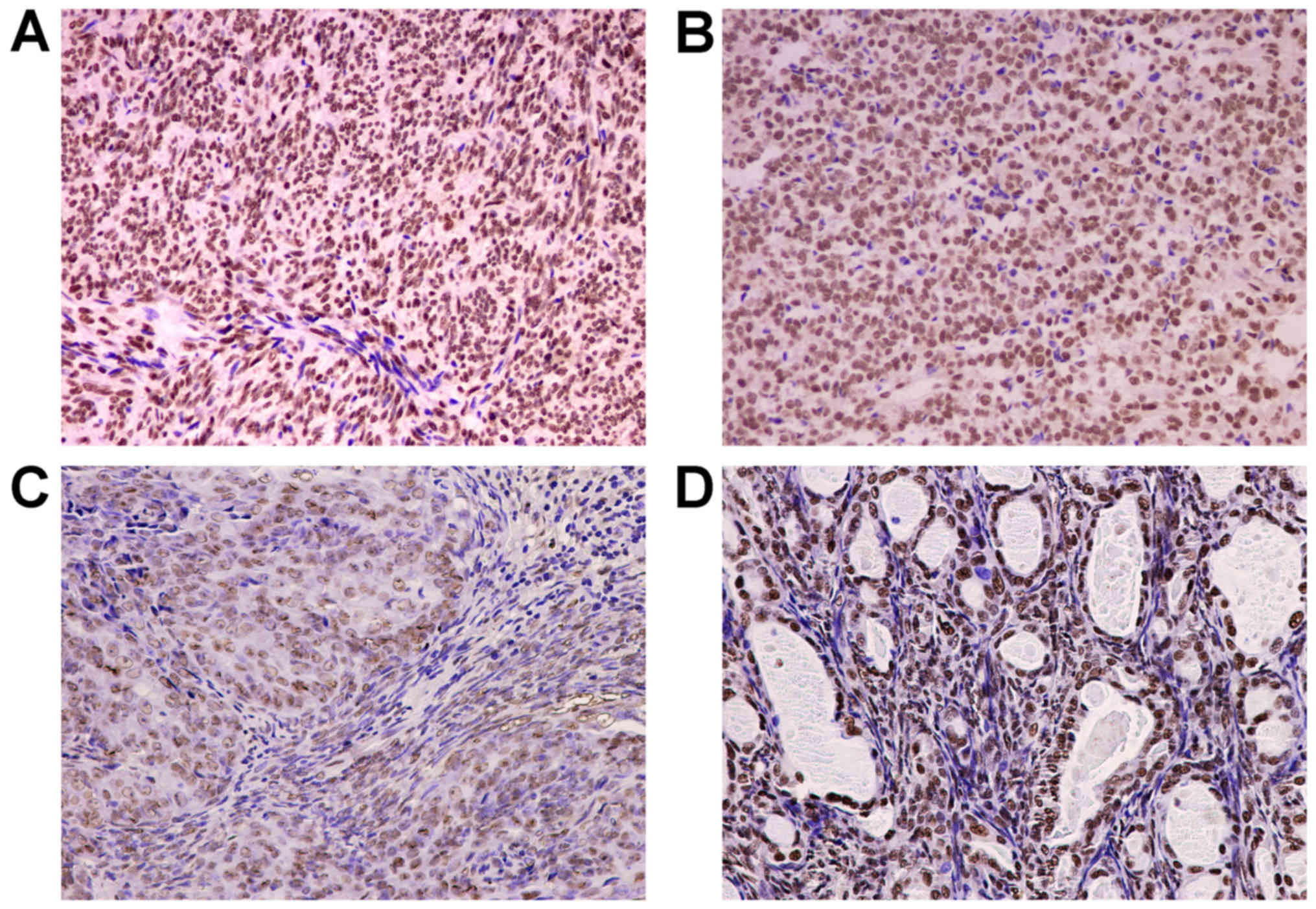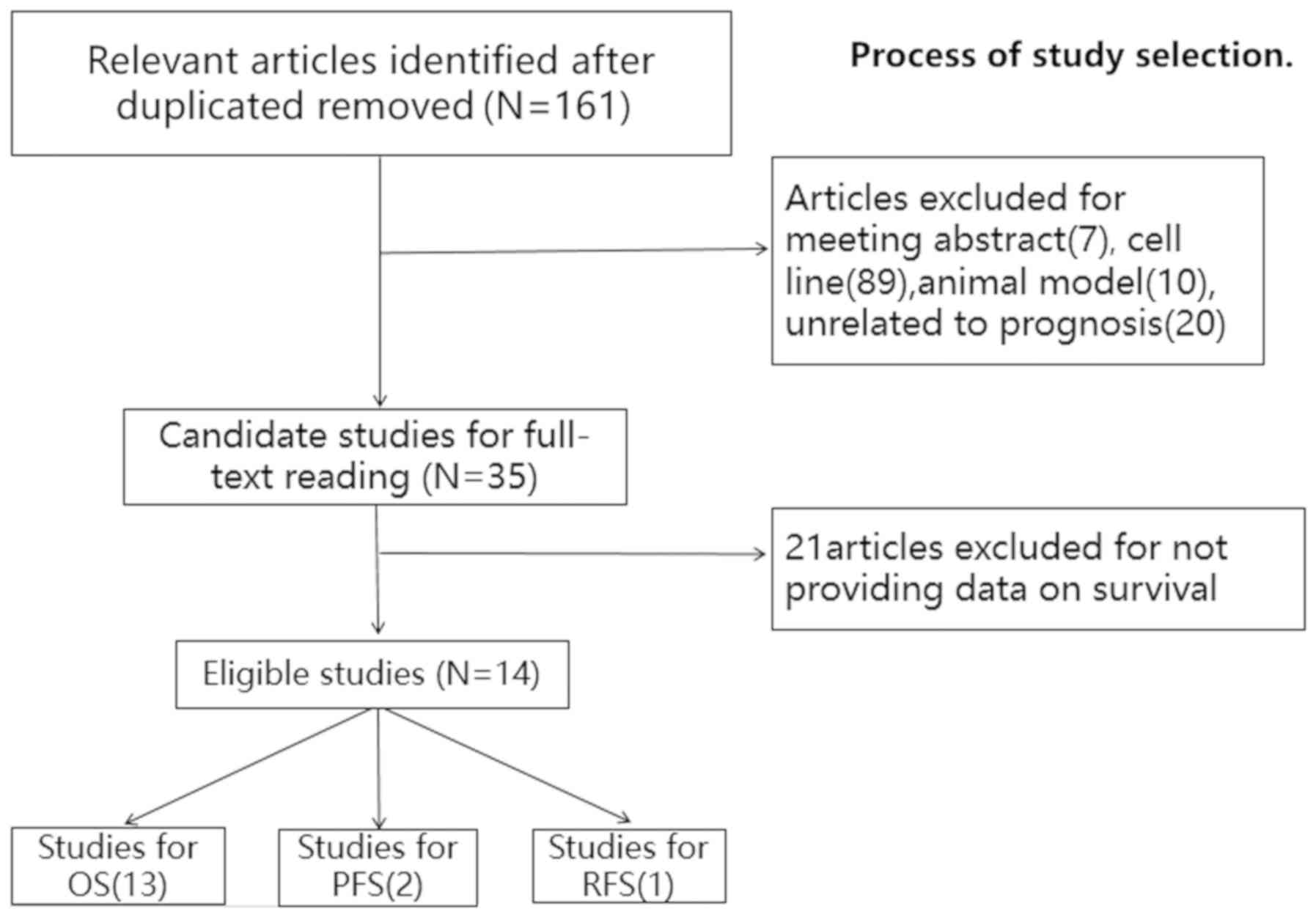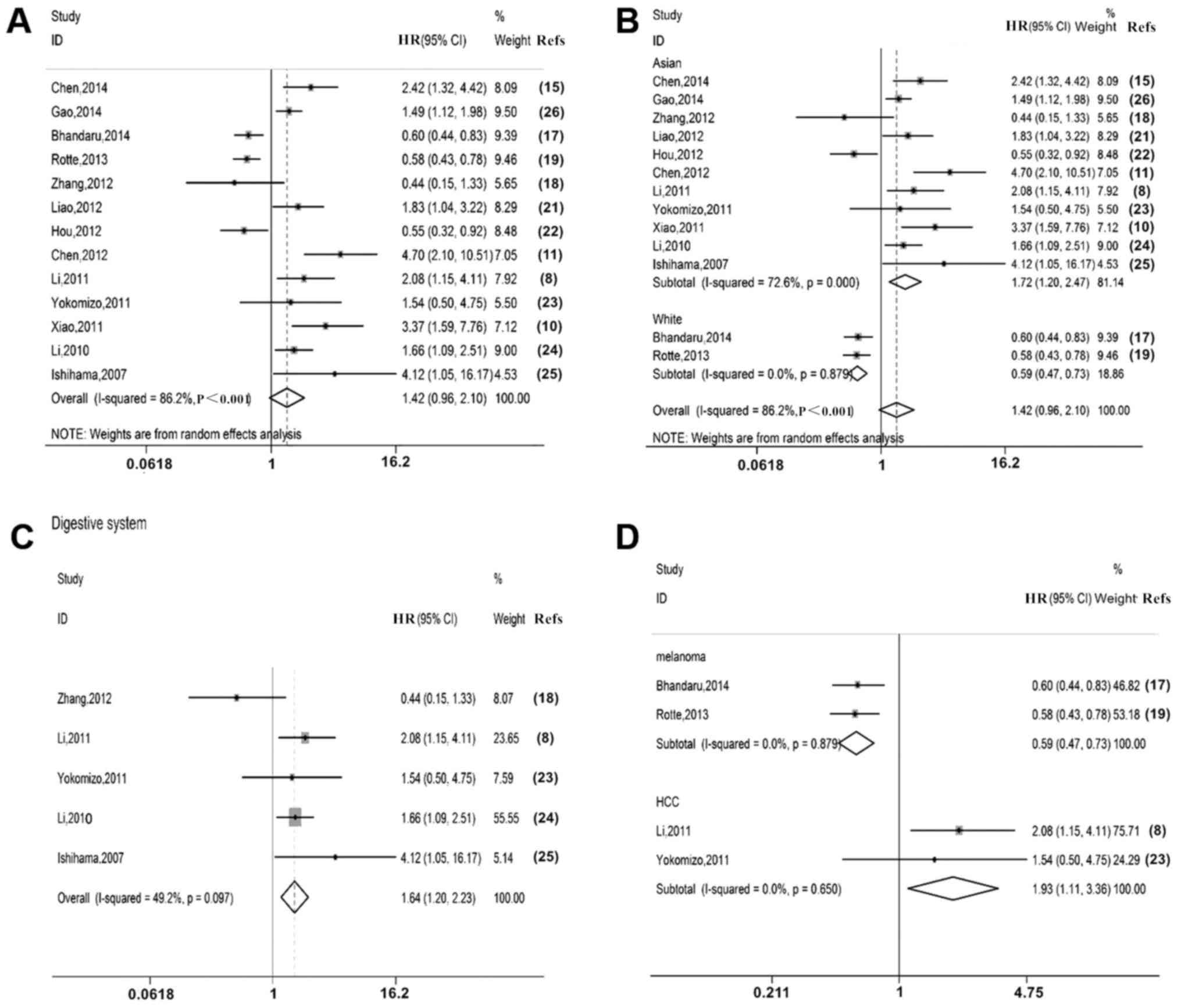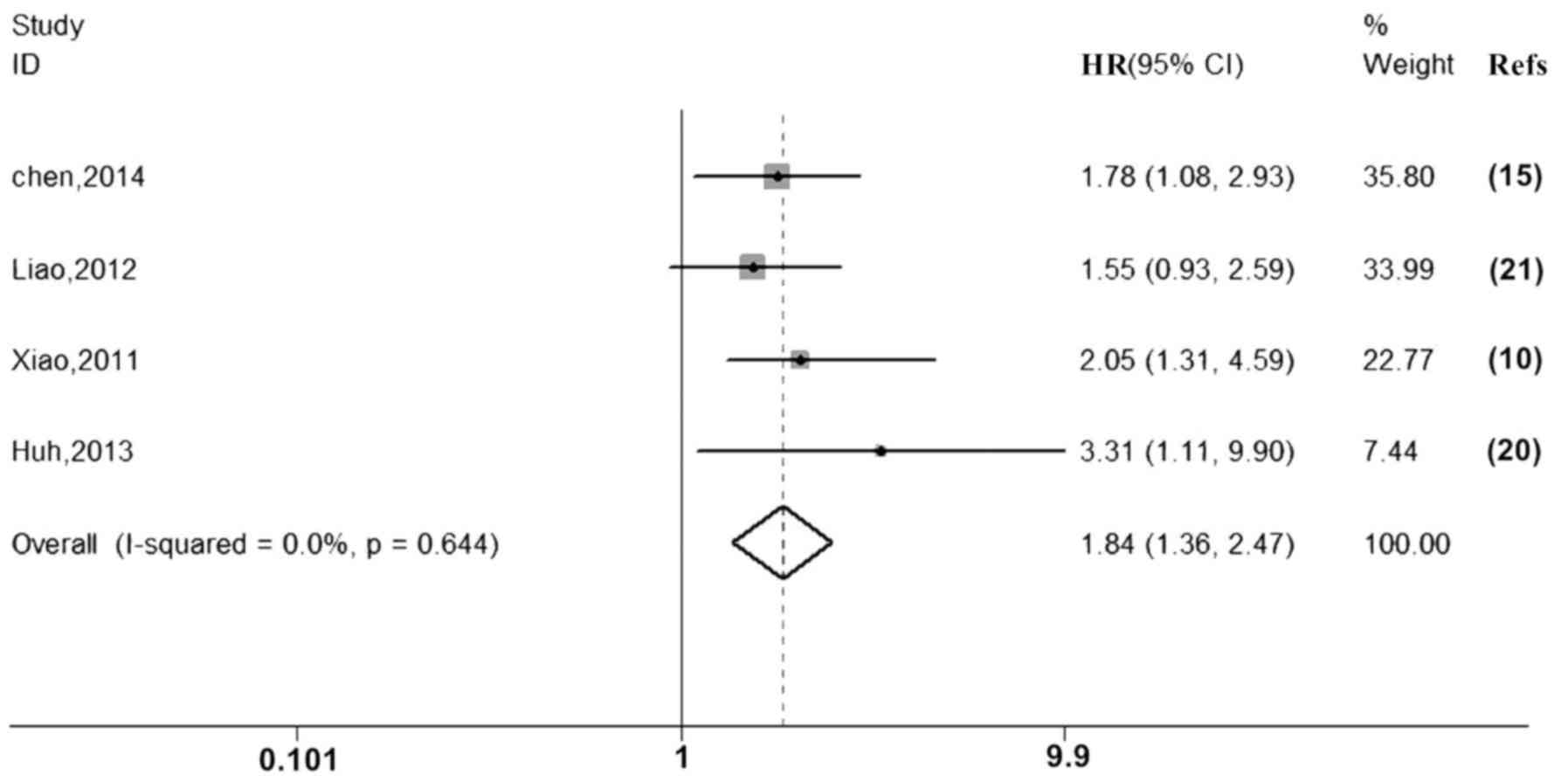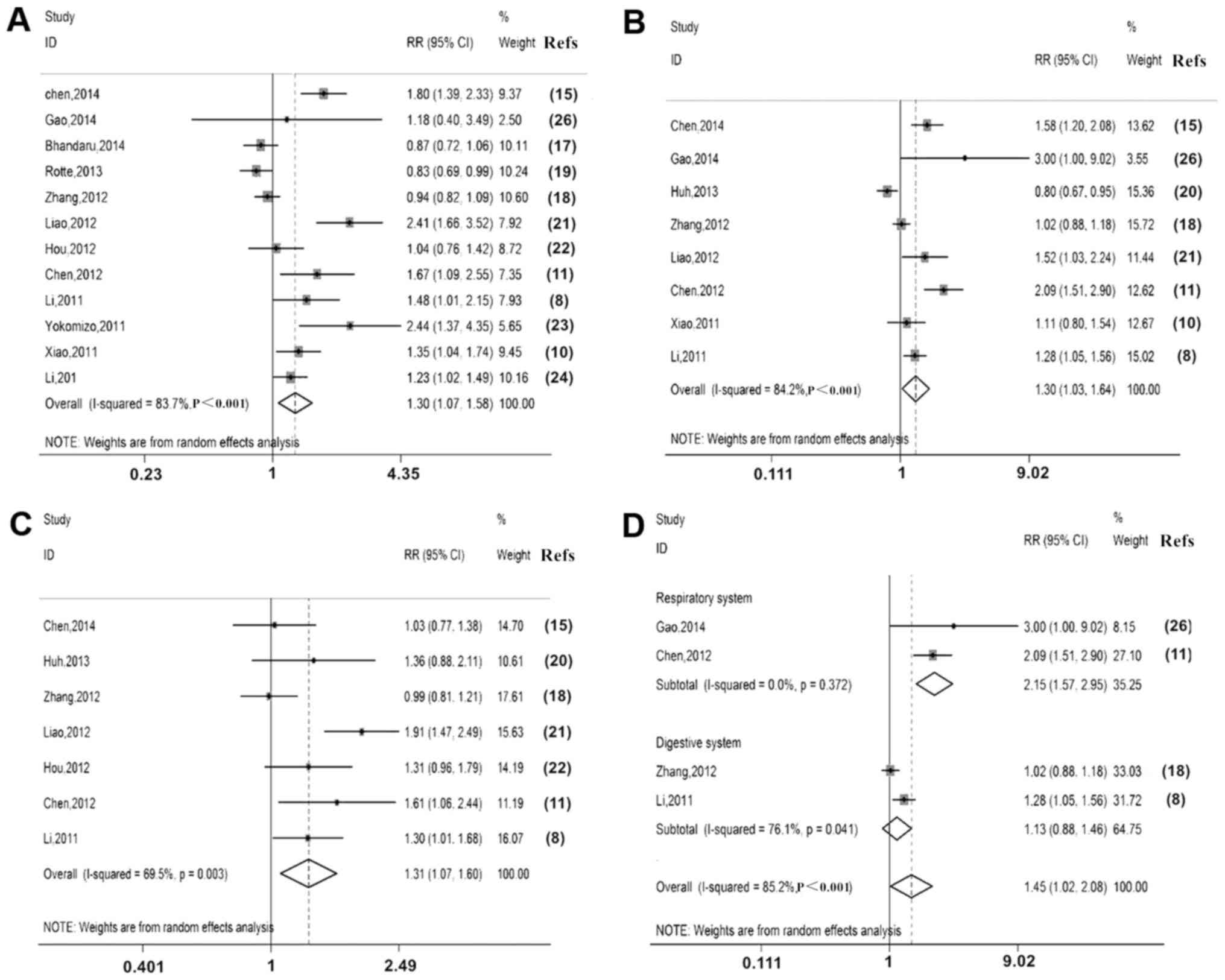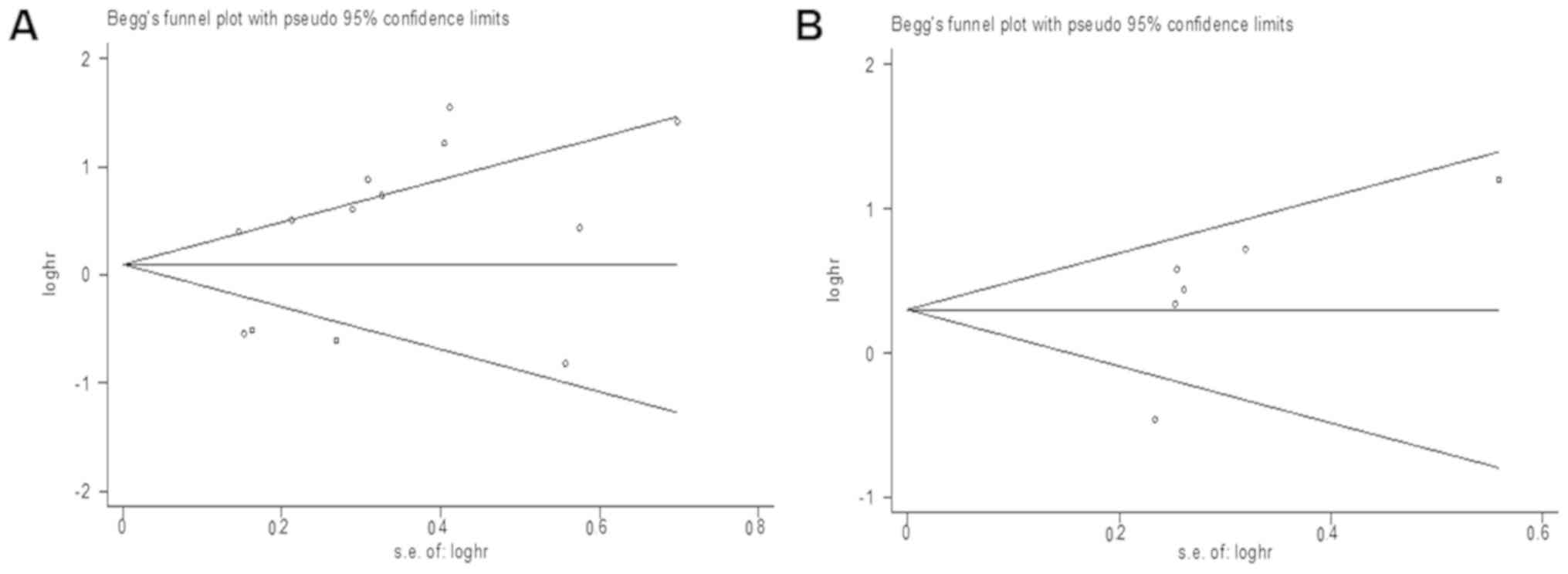|
1
|
Kundu TK, Palhan VB, Wang Z, An W, Cole PA
and Roeder RG: Activator-dependent transcription from chromatin in
vitro involving targeted histone acetylation by p300. Mol Cell.
6:551–561. 2000. View Article : Google Scholar : PubMed/NCBI
|
|
2
|
Vo N and Goodman RH: CREB-binding protein
and p300 in transcriptional regulation. J Biol Chem.
276:13505–13508. 2001. View Article : Google Scholar : PubMed/NCBI
|
|
3
|
Huang WC and Chen CC: Akt phosphorylation
of p300 at Ser-1834 is essential for its histone acetyltransferase
and transcriptional activity. Mol Cell Biol. 25:6592–6602. 2005.
View Article : Google Scholar : PubMed/NCBI
|
|
4
|
Muraoka M, Konishi M, Kikuchi-Yanoshita R,
Tanaka K, Shitara N, Chong JM, Iwama T and Miyaki M: p300 gene
alterations in colorectal and gastric carcinomas. Oncogene.
12:1565–1569. 1996.PubMed/NCBI
|
|
5
|
Wang L, Huang X, Chai Y, Zou L, Chedrawe M
and Ding Y: Octreotide inhibits the proliferation of gastric cancer
cells through P300-HAT activity and the interaction of ZAC and
P300. Oncol Rep. 37:2041–2048. 2017. View Article : Google Scholar : PubMed/NCBI
|
|
6
|
Gayther SA, Batley SJ, Linger L, Bannister
A, Thorpe K, Chin SF, Daigo Y, Russell P, Wilson A, Sowter HM, et
al: Mutations truncating the EP300 acetylase in human cancers. Nat
Genet. 24:300–303. 2000. View
Article : Google Scholar : PubMed/NCBI
|
|
7
|
Shikama N, Lee CW, France S, Delavaine L,
Lyon J, Krstic-Demonacos M and La Thangue NB: A novel cofactor for
p300 that regulates the p53 response. Mol Cell. 4:365–376. 1999.
View Article : Google Scholar : PubMed/NCBI
|
|
8
|
Li M, Luo RZ, Chen JW, Cao Y, Lu JB, He
JH, Wu QL and Cai MY: High expression of transcriptional
coactivator p300 correlates with aggressive features and poor
prognosis of hepatocellular carcinoma. J Transl Med. 9:52011.
View Article : Google Scholar : PubMed/NCBI
|
|
9
|
Isharwal SM, Miller MC, Marlow C, Makarov
DV, Partin AW and Veltri RW: p300 (histone acetyltransferase)
biomarker predicts prostate cancer biochemical recurrence and
correlates with changes in epithelia nuclear size and shape.
Prostate. 68:1097–1104. 2008. View Article : Google Scholar : PubMed/NCBI
|
|
10
|
Xiao XS, Cai MY, Chen JW, Guan XY, Kung
HF, Zeng YX and Xie D: High expression of p300 in human breast
cancer correlates with tumor recurrence and predicts adverse
prognosis. Chin J Cancer Res. 23:201–207. 2011. View Article : Google Scholar : PubMed/NCBI
|
|
11
|
Chen YF, Luo RZ, Li Y, Cui BK, Song M,
Yang AK and Chen WK: High expression levels of COX-2 and P300 are
associated with unfavorable survival in laryngeal squamous cell
carcinoma. Eur Arch Otorhinolaryngol. 270:1009–1017. 2013.
View Article : Google Scholar : PubMed/NCBI
|
|
12
|
Qi Y, Wang CC, He YL, Zou H, Liu CX, Pang
LJ, Hu JM, Jiang JF, Zhang WJ and Li F: The correlation between
morphology and the expression of TGF-β signaling pathway proteins
and epithelial-mesenchymal transition-related proteins in synovial
sarcomas. Int J Clin Exp Pathol. 6:2787–2799. 2013.PubMed/NCBI
|
|
13
|
Greenwood DC: Meta-analysis of
observational studies. Mod Methods Epidemiol. 173–189. 2012.
View Article : Google Scholar
|
|
14
|
Egger M, Davey Smith G, Schneider M and
Minder C: Bias in meta-analysis detected by a simple, graphical
test. BMJ. 315:629–634. 1997. View Article : Google Scholar : PubMed/NCBI
|
|
15
|
Chen MK, Cai MY, Luo RZ, Tian X, Liao QM,
Zhang XY and Han JD: Overexpression of p300 correlates with poor
prognosis in patients with cutaneous squamous cell carcinoma. Br J
Dermatol. 172:111–119. 2015. View Article : Google Scholar : PubMed/NCBI
|
|
16
|
Gao Y, Geng J, Hong X, Qi J, Teng Y, Yang
Y, Qu D and Chen G: Expression of p300 and CBP is associated with
poor prognosis in small cell lung cancer. Int J Clin Exp Pathol.
7:760–767. 2014.PubMed/NCBI
|
|
17
|
Bhandaru M, Ardekani GS, Zhang G, Martinka
M, McElwee KJ, Li G and Rotte A: A combination of p300 and Braf
expression in the diagnosis and prognosis of melanoma. BMC Cancer.
14:3982014. View Article : Google Scholar : PubMed/NCBI
|
|
18
|
Zhang LH, Huang Q, Fan XS, Wu HY, Yang J
and Feng AN: Clinicopathological significance of SIRT1 and p300/CBP
expression in gastroesophageal junction (GEJ) cancer and the
correlation with E-cadherin and MLH1. Pathol Res Pract.
209:611–617. 2013. View Article : Google Scholar : PubMed/NCBI
|
|
19
|
Rotte A, Bhandaru M, Cheng Y, Sjoestroem
C, Martinka M and Li G: Decreased expression of nuclear p300 is
associated with disease progression and worse prognosis of melanoma
patients. PLoS One. 8:e754052013. View Article : Google Scholar : PubMed/NCBI
|
|
20
|
Huh JW, Kim HC, Kim SH, Park YA, Cho YB,
Yun SH, Lee WY and Chun H: Prognostic impact of p300 expression in
patients with colorectal cancer. J Surg Oncol. 108:374–377. 2013.
View Article : Google Scholar : PubMed/NCBI
|
|
21
|
Liao ZW, Zhou TC, Tan XJ, Song XL, Liu Y,
Shi XY, Huang WJ, Du LL, Tu BJ and Lin XD: High expression of p300
is linked to aggressive features and poor prognosis of
nasopharyngeal carcinoma. J Transl Med. 10:1102012. View Article : Google Scholar : PubMed/NCBI
|
|
22
|
Ono H, Basson MD and Ito H: P300
inhibition enhances gemcitabine-induced apoptosis of pancreatic
cancer. Oncotarget. 7:51301–51310. 2016. View Article : Google Scholar : PubMed/NCBI
|
|
23
|
Hou X, Li Y, Luo RZ, Fu JH, Zhang LJ and
Yang HX: High expression of the transcriptional co-activator p300
predicts poor survival in resectable non-small cell lung cancers.
Eur J Surg Oncol. 38:523–530. 2012. View Article : Google Scholar : PubMed/NCBI
|
|
24
|
Li Y, Yang HX, Luo RZ, Zhang Y, Li M, Wang
X and Jia WH: High expression of p300 has an unfavorable impact on
survival in resectable esophageal squamous cell carcinoma. Ann
Thorac Surg. 91:1531–1538. 2011. View Article : Google Scholar : PubMed/NCBI
|
|
25
|
Ishihama K, Yamakawa M, Semba S, Takeda H,
Kawata S, Kimura S and Kimura W: Expression of HDAC1 and CBP/p300
in human colorectal carcinomas. J Clin Pathol. 60:1205–1210. 2007.
View Article : Google Scholar : PubMed/NCBI
|
|
26
|
Qi Y, Wang N, Pang LJ, Zou H, Hu JM, Zhao
J, Zhang J, Liu CX, Zhang WJ, Yuan XL and Li F: Identification of
potential mutations and genomic alterations in the epithelial and
spindle cell components of biphasic synovial sarcomas using a human
exome SNP chip. BMC Med Genomics. 8:692015. View Article : Google Scholar : PubMed/NCBI
|
|
27
|
Liao ZW, Zhao L, Cai MY, Xi M, He LR, Yu
F, Zhou TC and Liu MZ: P300 promotes migration, invasion and
epithelial-mesenchymal transition in a nasopharyngeal carcinoma
cell line. Oncol Lett. 13:763–769. 2017. View Article : Google Scholar : PubMed/NCBI
|
|
28
|
Pifer PM, Farris JC, Thomas AL, Stoilov P,
Denvir J, Smith DM and Frisch SM: Grainyhead-like 2 inhibits the
coactivator p300, suppressing tubulogenesis and the
epithelial-mesenchymal transition. Mol Biol Cell. 27:2479–2492.
2016. View Article : Google Scholar : PubMed/NCBI
|
|
29
|
Inagaki Y, Shiraki K, Sugimoto K, Yada T,
Tameda M, Ogura S, Yamamoto N, Takei Y and Ito M: Epigenetic
regulation of proliferation and invasion in hepatocellular
carcinoma cells by CBP/p300 histone acetyltransferase activity. Int
J Oncol. 48:533–540. 2016. View Article : Google Scholar : PubMed/NCBI
|
|
30
|
Gao XN, Lin J, Ning QY, Gao L, Yao YS,
Zhou JH, Li YH, Wang LL and Yu L: A histone acetyltransferase p300
inhibitor C646 induces cell cycle arrest and apoptosis selectively
in AML1-ETO-positive AML cells. PLoS One. 8:e554812013. View Article : Google Scholar : PubMed/NCBI
|
|
31
|
Ono H, Basson MD and Ito H: P300
inhibition enhances gemcitabine-induced apoptosis of pancreatic
cancer. Oncotarget. 7:51301–51310. 2016. View Article : Google Scholar : PubMed/NCBI
|
|
32
|
Dou YL, Lin JP, Liu FE, Wang LY, Shu HH,
Jiang N, Xie Y and Duan Q: Midazolam inhibits the proliferation of
human head and neck sqamous carcinoma cells by downregulating p300
expression. Tumour Biol. 35:7499–7504. 2014. View Article : Google Scholar : PubMed/NCBI
|
|
33
|
Mohammed SI, Springfield S and Das R: Role
of epigenetics in cancer health disparities. Methods Mol Biol.
863:395–410. 2012. View Article : Google Scholar : PubMed/NCBI
|
|
34
|
Langevin SM and Kelsey KT: The fate is not
always written in the genes: Epigenomics in epidemiologic studies.
Environ Mol Mutagen. 54:533–541. 2013. View Article : Google Scholar : PubMed/NCBI
|
|
35
|
McCracken M, Olsen M, Chen MS Jr, Jemal A,
Thun M, Cokkinides V, Deapen D and Ward E: Cancer incidence,
mortality, and associated risk factors among Asian Americans of
Chinese, Filipino, Vietnamese, Korean, and Japanese ethnicities. CA
Cancer J Clin. 57:190–205. 2007. View Article : Google Scholar : PubMed/NCBI
|
|
36
|
Chien C, Morimoto LM, Tom J and Li CI:
Differences in colorectal carcinoma stage and survival by race and
ethnicity. Cancer. 104:629–639. 2005. View Article : Google Scholar : PubMed/NCBI
|















